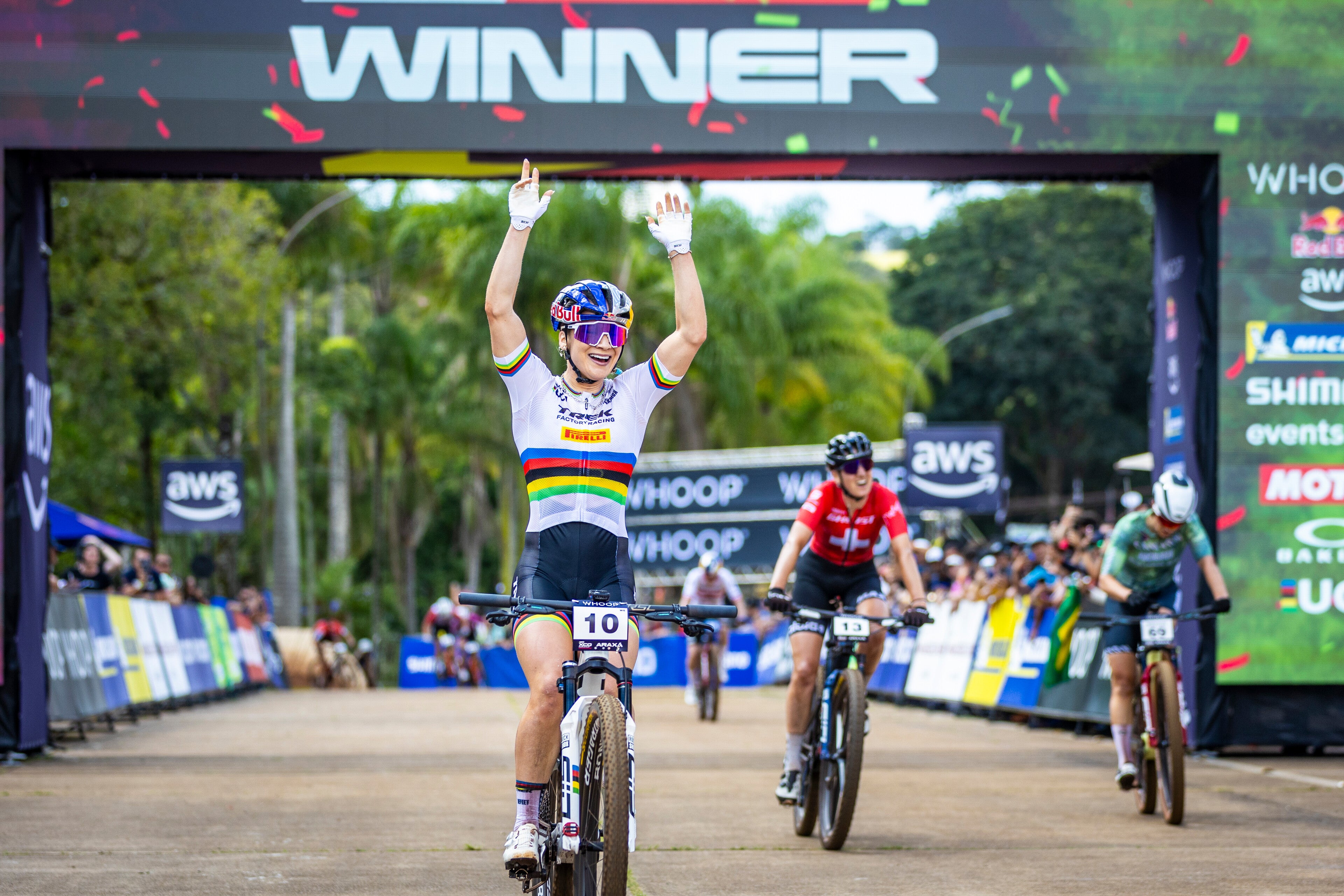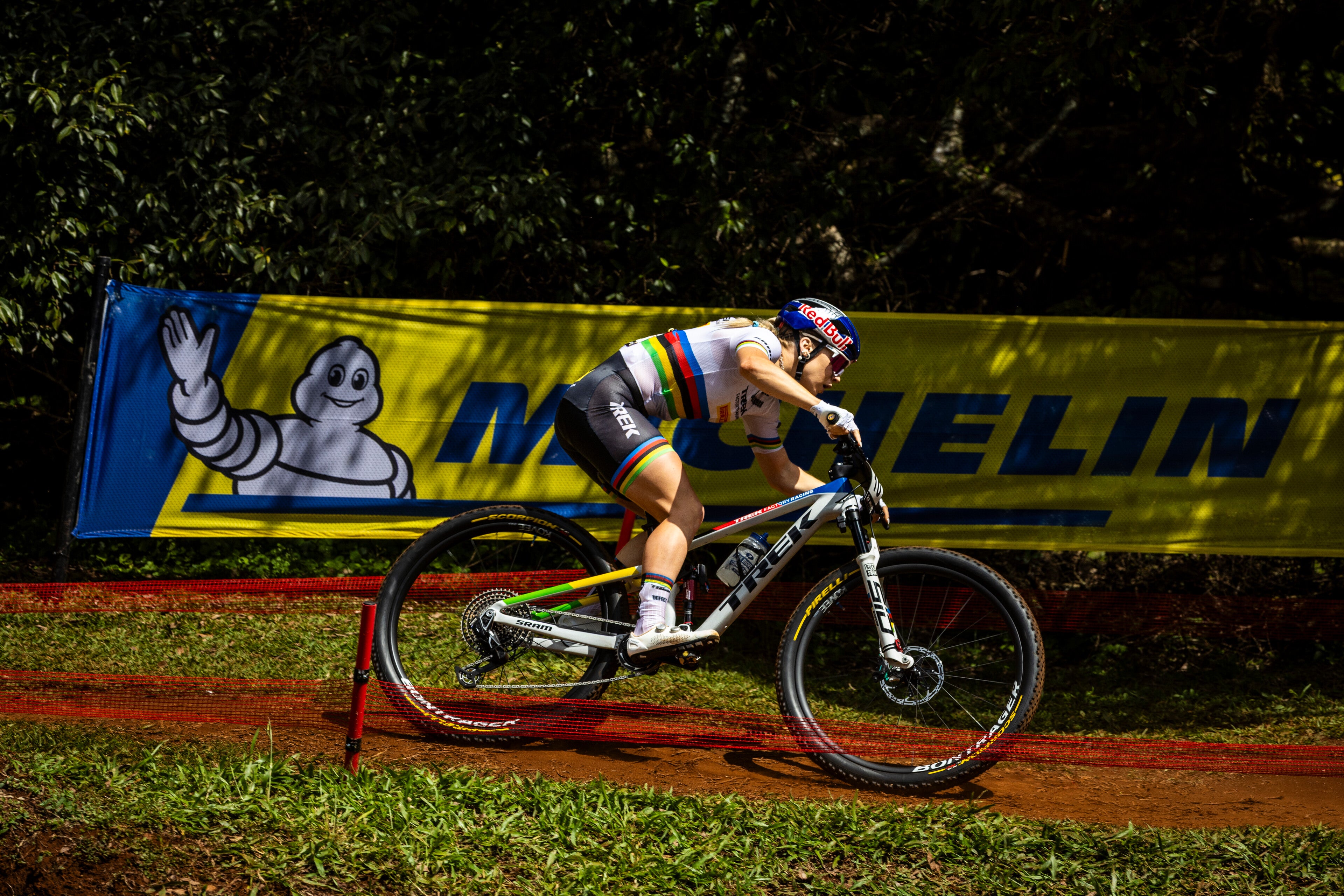ARTICLE AD BOX
“I think I was born to race short track”, Evie Richards jokes, fresh off a near-flawless start to her mountain biking season. The 28-year-old started the year with wins in the short-track discipline on two consecutive weekends in Araxa, Brazil, before a third place in the longer cross-country race.
Her second win in Araxa this April saw her break French veteran Pauline Ferrand-Prevot’s record of short-track wins to set a new elite women’s record of seven, but she laughs: “I had no idea! Luckily I didn’t know because I was so nervous for that race.
“For me that race was like a six out of 10 of where I want to be fitness wise,” she adds, “so I was dead happy.”
The Red Bull athlete’s opening win in Araxa marked the high point of one of many comebacks for the Malvern-born rider. It was her first time back at the Brazilian race since she suffered a concussion there last year, three months before the Paris Olympic Games.
“It's quite scary racing a course which knocked you out for so long,” she says. “When I'm in practice, I'm like a granny, I'm so scared – but when I come to race I'm pretty fearless. But on that course, I didn't feel that sort of confidence on the descents, I was very much aware of how big the crash was.”
She says she spent three weeks “in denial” that she even had a concussion. “When you have a broken leg, people can see you're injured,” she says. “When it's in your brain… my mum and dad could see that I was struggling because my eyes weren't right. [But] unless you were really close to me, you couldn't see it.
“I can't really describe it, but your brain just kind of shuts off. It felt like there wasn't much emotion to be sad about the Olympics, because there was not much going on up there. I was just in so much discomfort.”
An intensive training plan was put in place with the goal of, against the odds, getting her ready for Paris. She set up a static bike in her shed at home and would ride with her eyes closed before going back to bed for the rest of the day, shattered.
“There was only so much I could expend my energy on. I didn’t leave the house, really. I just went to the static bike and came back in, and then I got the all clear to race.
“I hadn’t left the house for six weeks. I hadn’t done a food shop, I hadn’t seen friends, hadn’t done anything. I basically killed myself on the bike for six weeks to try and get that fitness up. It was probably the quickest I've ever got fit and I didn't even think it was possible.”
It was a huge jump going back to World Cup racing, the Trek Factory Racing rider says. “I was sharing an Airbnb with my teammates, and just eating dinner with them felt hard. There were so many stimuli that I hadn’t had for so long. Racing was really overwhelming. Processing a descent, I found really hard. I was thrown in at the deep end.

“After the first race I was crying. When I go to a World Cup, you want to be in fit shape to be podium potential. It’s so hard when you’re at the back of the pack where normally you’re near the front. But I suppose it makes you stronger, doesn't it?
“The whole concussion, all I had was the Olympics. That's all I was thinking of.”
The gruelling recovery process was worth it in the end and Richards - an infectiously bubbly personality - grins ear to ear as she remembers her time in Paris. She came fifth in the cross-country race, and says the experience “couldn't have been more perfect”.
“Number one, I made it there. To have all my family there, and mentally, to be on the start line smiling and happy, it was the most special experience ever.”
She jokes that in both years she has competed in the Olympics there have been two other constants: not only has she gone on to win the World Championships weeks later, but she’s also bought a house. A house move isn’t necessarily on the cards for 2028, but a gold medal in Los Angeles – an improvement on seventh in Tokyo 2021 and fifth in Paris – is a “really big goal”.
She has unfinished business with the Games, she adds. “It sounds really big headed, but for [Tokyo], that was the fittest I'd been that year. I just crumbled under the pressure. I remember doing course practice in the morning, and I was shaking so much I could hardly stay on the bike.”
.jpeg)
Time off after the Games to visit Cornwall with her family meant she lost fitness ahead of the World Championships in Val di Sole, “but mentally, I was much stronger,” she adds, and she won the mountain bike rainbow jersey for the first time. “I think that shows how important the mental side is, because I was just too nervous to control the emotions at the Olympics.”
Things were very different in Paris. Richards worked with her psychologist Rich Hampson on how she wanted to approach the race and joined a “girls group” featuring many of British cycling’s top female athletes, including BMX Olympic champion Beth Shriever and world and Olympic gold medallists Emma Finucane and Katie Archibald.
“All of us wanted to be showing our younger selves, look what we've achieved, and look how happy we are here,” she explains of their joint approach to the Games. “I wanted to be so grateful to be at the start and kind of happy no matter what happened. I feel like we did a lot of work to get to that state.”
Richards adds that that support network has extended beyond Paris: “If one of us is struggling, we'll probably post in [the group chat] and say, like, ‘We're a bit nervous because we're wearing the jersey this year. Can anyone offer any help?’ And we'll just check in. I love my friends from home, but it's not something they can relate to, or they don't always understand, so it's nice to have those girls.”
The 28-year-old notes that her perspective has changed dramatically since her early career, when she was consistently under-fuelling and over-training and was permanently exhausted. An obsession with clean eating and keeping her weight down meant she developed Relative energy deficiency in sport (Red-S), a chronic condition of low energy caused by a long-term calorie deficit, and didn’t get her period for three years.
“I almost saw it as an achievement,” she admits, as it meant her training wasn’t affected. But her racing suffered. She was frequently sick in races, abandoning them after repeatedly throwing up on the bike, and fainted after winning the cyclo-cross under-23 World Championships in 2018.

It took a recurring knee injury in 2019 and 2020, which required surgery, for her to seek help from Hampson and nutritionist Renee McGregor - two people who remain key members of her support team to this day.
She recalls thinking, “I have the time to put on the weight if I need to, and I'm away from the camera, so if my body shape changes, no one's gonna know. Then by the time I'd recovered from my knee surgery I'd got back to the World Cup. I think I won the second World Cup I’d got back to, and I won it happy, with my period, and I was like, ‘oh my God, you can do it all.’
“I wouldn’t want anyone to dislocate their knee! But for me it was a really good thing to happen, at that time of my career. If it had gone on any longer I might not have been riding still, I might have burnt out, and I probably wouldn't have been happy.”
The impact was huge. Since her return from the knee injury and her mental and physical recovery she has never been sick on the bike. Richards notes that the wider landscape of the sport has changed too in the years since her diagnosis, with the emphasis now on being strong and healthy for races rather than being as light as possible to get up climbs.
“If you said Red-S to someone I think people would understand it [now], but I feel like six years ago it wasn’t a common thing,” she says. “I think we’re in a much better space of knowledge now in the sport.
“The funny thing is I always did sport to be healthy – I wanted to be the fittest grandma when I’m older,” she recalls. “And the ironic thing is I’d got so far from that.
“I’ve just found that balance now,” she says. “I have a really different perspective. I still want to win, but I know you can’t win all the races. I still find it hard sometimes, but I feel like every year I’m growing and learning more.”









 English (US) ·
English (US) ·